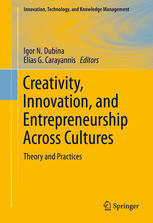

Most ebook files are in PDF format, so you can easily read them using various software such as Foxit Reader or directly on the Google Chrome browser.
Some ebook files are released by publishers in other formats such as .awz, .mobi, .epub, .fb2, etc. You may need to install specific software to read these formats on mobile/PC, such as Calibre.
Please read the tutorial at this link: https://ebookbell.com/faq
We offer FREE conversion to the popular formats you request; however, this may take some time. Therefore, right after payment, please email us, and we will try to provide the service as quickly as possible.
For some exceptional file formats or broken links (if any), please refrain from opening any disputes. Instead, email us first, and we will try to assist within a maximum of 6 hours.
EbookBell Team

4.0
86 reviewsThe aim of this volume is to further develop the relationship between culture and manifold phenomena of creativity, innovation and entrepreneurship in order to promote further and better understanding how, why, and when these phenomena are manifested themselves across different cultures.
Currently, cross-cultural research is one of the most dynamically and rapidly growing areas. At the same time, creativity, inventiveness, innovation, and entrepreneurship are championed in the literature as the critical element that is vital not just for companies, but also for the development of societies. A sizable body of research demonstrates that cultural differences may foster or inhibit creative, inventive, innovative and entrepreneurial activities; and each culture has its own strengths and weaknesses in these regards. Better understanding of cultural diversity in these phenomena can help to build on strengths and overcome weaknesses.
Cross-cultural studies in this field represent a comparatively new class of interdisciplinary research. This is a field where cultural, sociological, psychological, historical, economic, management, technology and business studies closely intersect. In this book, a global team of researchers representing Europe, Asia, and the Americas review, analyze, structure, systematize and discuss various concepts, assumptions, speculations, theories, and empirical research which focus on the effect of national cultures on creativity, invention, innovation, and entrepreneurship. They argue that national culture is not only an extremely important determinant of innovation and business development, but also demonstrate that some aspects relating to these phenomena may be universal among all cultures, thereby identifying those factors that may easily be transferred across cultures from those that are unique to their specific context.